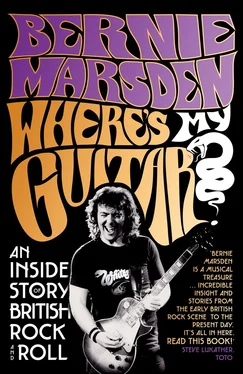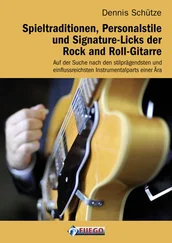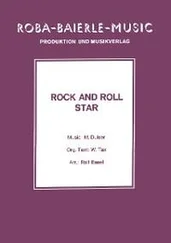We had another setback when there was a robbery and all of the Jokers’ equipment was stolen. The story made front page of the Buckingham Advertiser and they sent a photographer who asked us to look appropriately sad. I felt a bit of a fraud as the only equipment I owned was safely back at home: I would never, ever leave my guitar behind.
The Jokers ran out of steam and I came across the Originals, whose guitarist Nipper Rogers had been such an inspiration to me. On one Sunday afternoon I was playing acoustic guitar in the garden of the King’s Head. Originals’ singer Keith ‘Diver’ Fenables heard me playing, asked who I was, and then disappeared. He had gone to tell drummer Les Castle about this new kid playing the guitar. He casually asked me if I could play any of their songs and I said yes, I could.
‘Good,’ he smiled back at me. ‘Be here at seven tonight.’
It dawned on me that I had just signed myself up to a gig. Nipper Rogers’ job took him away from the area and the Originals couldn’t do any gigs – until this particular Sunday! I was petrified: not only had I only played their songs in my bedroom, but Nipper was streets ahead of me as a guitar player My mouth had said that I could do it and so now I would play in a pub packed with punters.
I arrived at the King’s Head at about six, very nervous, and a little panicked because I didn’t have an amplifier. Les Castle was setting up his drum kit and had a big smile.
‘Well, you are young, my boy,’ he said, pointing to Nipper’s Burns Orbit 3 amplifier. ‘Use that.’ Les, Keith and I played in a corner of the main bar without a bass player. I kept my head down to avoid making any eye contact with the audience. I was pleased not to hear any booing after the first few songs. Les Castle gave me another smile.
‘Fabulous, my boy, carry on like that!’
We played ‘I Can Tell’, ‘Shakin’ All Over’, ‘Green Green Grass of Home’, ‘Twist and Shout’, ‘Kansas City’, ‘Look Through Any Window’ and ‘Hoochie Coochie Man’. By this time Keith Fenables was also smiling.
Half an hour later it sank in – I was playing with the Originals. I dreaded to think how it sounded, but after a few songs I felt brave enough to glance at the crowd. They were looking happy and a little shell-shocked. Who the hell was this wonder kid? Where was Nipper, the one-and-only, local Hank Marvin? The audience got louder as the night went on, and everyone had a bloody good time. At the end of the night, Keith introduced me to the crowd: ‘Let’s hear it for the new kid on the cuh-tah, ladeez an’ genelmen!’
Keith was deliriously happy. Never again would Nipper Rogers dictate to the Originals: here was a readymade and impressionable new player they could call on, unencumbered by girlfriend or job. The position of my hero Nipper as the top dog was gone after one Sunday night in the King’s Head. I was the new kid in town. Nipper never once called me out for taking his gig. Not only that but he was the single influence among all the great guitarists who made me believe I could pick up a guitar. Thanks, Nipper.
The bonus that night was that I got paid! Thirty shillings, a pound note, a 10-bob note and a baguette sandwich to take home. I could sense things were about to change – this was a turning point for the very young BM. I was hired for the regular Sunday night Originals gigs and the Hofner Colorama paid for itself many times over. I practised hard, improving the guitar parts on the songs and gaining in confidence. All my earnings were put aside at home for a Fender Strat and amp, and my mum found the savings one afternoon. There must have been the best part of a hundred pounds, a hell of a wad for a teenager. She and Dad sat me down to ask where I’d got the money from. It was only fairly recently that my dad admitted they thought I might have been a robber. They never expected I was paid to play. My dad’s face lit up although dear old Mum seemed a little sceptical. I soon acquired my own Burns Orbit amplifier.
We played most weekends, mainly in pubs, working men’s clubs and at wedding receptions and I got my first taste of fame. I loved it. I became quite a draw at the King’s Head, a local guitar hero. People treated me slightly differently – most were positive, although a few were jealous and some were unable to accept that this young kid could play the guitar at all. Women who were years older than me loved to hang out with the band, regardless of their marital status. Some weekends I was invited to a female fan’s house for a drink. I got to know a lot of them and I must have been very different to their husbands who had to be at work the next morning, mainly because I had to be back at school.
By the time I was 15, I was in my room so much, playing guitar, that I had become a bit of a loner at school. I did have a few good mates: Richard Bernert, Steve Wheeler, Derek Knee and Mick Hodgkinson, but even then it was the common love of music that connected us. I’d often go to Richard’s and mime to the Small Faces’ first album he played at maximum volume in the living room. I was Steve Marriott, of course, and Richard was Kenney Jones knocking the crap out of a cake tin and cushions with a knife and fork.
Music also played a background role in a job I did with Derek and Richard. We worked for a local chicken farmer, feeding thousands of chickens, collecting eggs, and cleaning out the cages. It was pretty well-paid for the time. The henhouse was an inferno of squawking, but we had a very loud radio pumping out Radio Caroline or Radio London from an eight-inch Fane speaker. The first time I ever heard the Stones’ ‘Jumpin’ Jack Flash’ was on Radio Caroline. The opening line really grabbed my attention.
Pirate radio was so important. I got to hear fantastic records one after another, and maximum volume in the henhouse made them sound so much better. The radio reception was unpredictable: some days our area was good, but I was likely to lose the guitar solo just when I was ready to learn it!
I didn’t want to leave school at 15, so I stayed for another year, not knowing what I wanted to do in terms of a ‘proper’ job. The only clear path I had in my mind was something involving guitar. And, boy, was I playing a lot of it by the time I reached my final year …
At the start of the year there was mass excitement because of the arrival of a new 22-year-old French teacher, Elizabeth Rees. She was a great-looking girl, about five foot three, long, black hair, glasses on the end of her nose, short skirt and high-heeled shoes. I think she could tell she was near enough every schoolboy’s fantasy. She stopped me in the corridor to ask why I had opted to take history instead of French. As she smiled at me I asked myself the same question. She said that she would make sure I worked hard and I went to the school office and promptly dumped history. I never did learn much French, but she did teach me one hell of a lot about life.
Elizabeth had heard me playing with the Originals and said she was astonished by my playing and I would be famous one day. This was a revelation – she was the only forward-thinker in the school, heading for the Seventies with the same attitude as all the kids who were stumbling towards that decade of change.
Despite my passion for the guitar, music had never been a favourite lesson. I didn’t know or care what a stave was – tiny black squiggles on five straight lines did not seem like music – but I enjoyed the playing side. I remember one lesson I was playing to some girls when music teacher Mrs Gwen Clark arrived. I put the guitar down.
‘Don’t put that thing away just yet,’ she said with a hint of sarcasm. She passed me a handwritten sheet music. ‘So, can you play that?’
I looked at the paper – black squiggles on a stave. I couldn’t decipher it. She was making a point about my sight-reading ability.
Читать дальше












